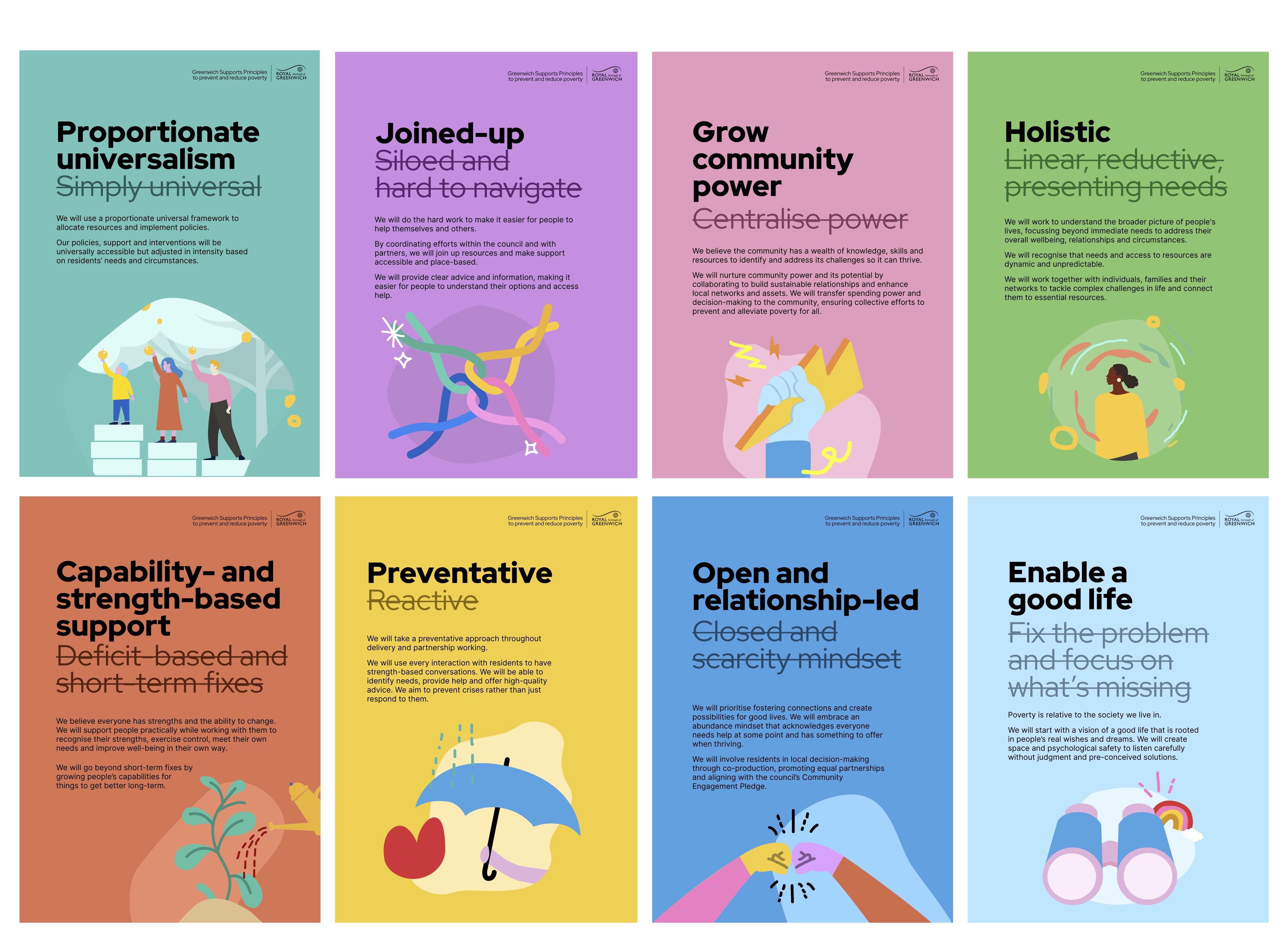Greenwich Supports principles and hypothesis
Our principles
 We’ve established a set of principles based on research and engagement with Greenwich residents, partners and staff.
We’ve established a set of principles based on research and engagement with Greenwich residents, partners and staff.
These principles capture the values and beliefs of our community in realising our Greenwich Supports vision. They require a significant shift in thinking and being. They should guide strategy development, service design, policy-making and direct support efforts.
They can be adopted by everyone addressing poverty, ensuring our actions are effective, equitable, and aligned with our shared goals.
Read more about our principles
Preventative (not reactive)
We will take a preventative approach throughout delivery and partnership working. We will use every interaction with residents to have strength-based conversation.
We will be able to identify needs, provide help, and offer high-quality advice, aiming to prevent crises rather than just respond to them.
Proportionate universalism (not simply universal)
We will use a proportionate universal framework to allocate resources and implement policies. Our policies, support and interventions will be universally accessible but adjusted in intensity based on residents’ needs and circumstances.
Definition of proportionate universalism from the Marmot Review
Joined-up (not siloed and hard to navigate)
We will do the hard work to make it easier for people to help themselves and others. By coordinating efforts within the council and with partners, we will join up resources and make support accessible and place-based.
We will provide clear advice and information, making it easier for people to understand their options and access help.
Grow community power (not centralise power)
We believe the community has a wealth of knowledge, skills and resources to identify and address its challenges so it can thrive.
We will nurture community power and its potential by collaborating to build sustainable relationships and enhance local networks and assets.
We will transfer spending power and decision-making to the community, ensuring collective efforts to prevent and alleviate poverty for all.
New Local’s definition of community power
Holistic (not linear, reductive or focussing solely on presenting needs)
We will work to understand the broader picture of people's lives, focusing beyond their immediate needs to address their overall wellbeing, relationships and circumstances. We will recognise that needs and access to resources are dynamic and unpredictable.
We will work together with individuals, families, and their networks to tackle complex challenges in life and connect them to essential resources.
Enable a good life (not fix the problem and focus on what’s missing)
Poverty is relative to the society we live in. We will start with a vision of a good life that is rooted in people’s real wishes and dreams.
We will create space and psychological safety to listen carefully without judgment and pre-conceived solutions.
“The focus of development should be on advancing the richness of human life, rather than the richness of the economy in which human beings live" - Amartya Sen, Nobel-Memorial Prize Winner.
Capability and strength-based support (not deficit-based and short-term fixes)
We believe everyone has strengths and the ability to change. We will support people practically while working with them to recognise their strengths, exercise control, meet their own needs and improve well-being in their own way.
We will go beyond short-term fixes by growing people’s capabilities for things to get better long-term.
Further reading: Radical Help, Hilary Cottam
Open and relationship-led (not closed and scarcity mindset)
We will prioritise fostering connections and create possibilities for good lives. We will embrace an abundance mindset that acknowledges everyone needs help at some point and has something to offer when thriving.
We will involve residents in local decision-making through co-production, promoting equal partnerships and aligning with the council’s Community Engagement Pledge.
Our hypothesis
We believe residents experiencing poverty may reach out for support from various services or departments.
This support may often be too late and focused on the needs already being presented.
This puts strain on our crisis response which relies on temporary higher cost support rather than long term solutions, leaving residents with unaddressed issues.
We need to take a preventative, holistic, and person-centred approach every step of the way to prevent poverty and offer routes out of it. This means intervening earlier and working with people before they fall into crisis.